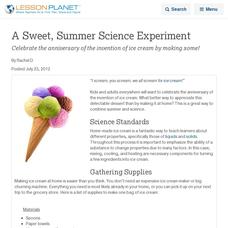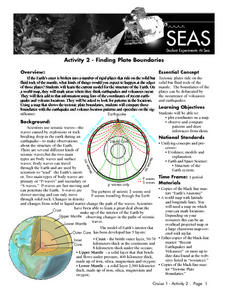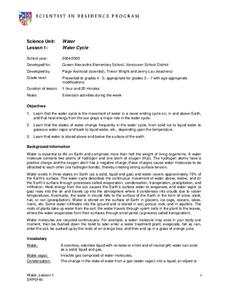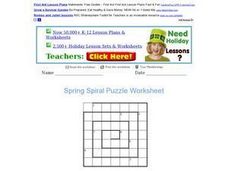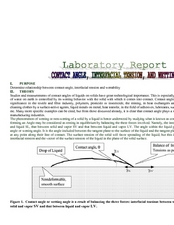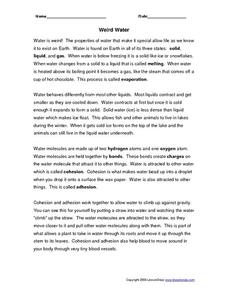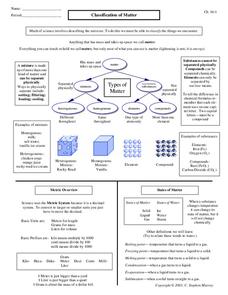Curated OER
Water and Ice
Learners study the water cycle and states of matter. In this water cycle lesson, students observe ice for a period of time and record their observations. Learners create a Venn Diagram comparing water in solid form and liquid form....
Curated OER
Water and Ice
Students explore water and how it changes forms. In this investigative lesson students participate in an activity that shows them how water changes form and what it looks and feels like.
Curated OER
A Sweet, Summer Science Experiment
Celebrate the anniversary of the invention of ice cream by making some!
Curated OER
Things Are Heating Up
In this science worksheet, students read about chemical changes. Students also answer 3 comprehension questions about the reading.
Curated OER
Recent Volcanoes And Earthquakes:
Students investigate the current model for the structure of the Earth. On a world map, they mark areas where they think earthquakes and volcanoes occur and compare those areas with earthquake and volcano location patterns.
Science Friday
Sublime Sublimation
Dry ice isn't dehydrated water, and young scientists learn why in this fascinating presentation. After watching a video, they complete three different activities using dry ice. Upon completion, they discuss the scientific principle.
BBC
Ourselves
Young biologists identify parts of the body, sort humans from other animals, and list the difference they see. Learners are split up into groups of three, and each group must find pictures in magazines of humans and other animals. They...
Curated OER
Ice Cream in a Bag
Students discuss the three states of matter and how they are affected by temperature. They make ice cream in a bag while observing how temperature change affects the mixture. They discuss why some specimens froze more quickly than others...
Curated OER
Water Cycle
Young scientists explore Earth elements by conducting an experiment. They define water vocabulary terms such as condensation and precipitation. In addition, they conduct a water experiment in which they build a terrarium, so they can...
Curated OER
Aerosol Lesson: Science - Graphing SAGE II Data
Learners examine and plot atmospheric data on bar graphs.
Curated OER
Changes in Matter
Eighth graders, in groups, explain the difference between physical and chemical changes.
Curated OER
Changes of State
Pupils examine molecules and the changes in energy of a system. In this energy systems lesson students complete a lab activity and describe changes of state.
Curated OER
Activity #13 Changing The Look of Sugar
Young scholars observe what happens when sugar is dissolved in water and when it is heated. They weigh the products after each of the two experiments on a balance scale. Pupils distinguish between physical and chemical changes. Students...
Curated OER
Spring Spiral Puzzle Worksheet
In this spring worksheet, students read and analyze 8 clues about spring. Students write their answers in a spiral word puzzle. There is no word bank.
Curated OER
Contact Angle. Interfacial Tension and Wetting
Students determine the contact angle of water on different surfaces. In this physics lesson, students calculate their percent error using a mathematical formula. They explain the advantages of using non-wetting surface for certain...
Curated OER
Weird Water
In this weird water worksheet, students read for information and assess comprehension. In this true and false, fill in the blank, and multiple choice worksheet, students answer ten questions.
Curated OER
The Water Cycle
In this water cycle activity, students read an informational passage, observe a labeled diagram of the transpiration water cycle, and answer comprehension questions. Students answer seven multiple choice questions and write a story from...
Curated OER
States of Matter
Student explore states of matter. In this science lesson plan, students define matter, identify the states of matter, tell about the properties of each state of matter, and demonstrate an understanding of the difference between a...
Curated OER
Ooblek
Students demonstrate the three states of matter. In this matter lesson, students read Bartholomew and the Ooblek. Students create "ooblek" and discuss what state of matter it is.
Curated OER
Matter and Molecular Motion
Fourth graders define the states of matter and their properties. They demonstrate the air is matter and observe the effect of molecular motion through these activities.
Curated OER
Classification of Matter
In this matter worksheet, learners compare the different types of matter, including the states of matter. Students review the metric system. This worksheet has 12 matching, 18 fill in the blank, and 4 short answer questions.
Curated OER
The Cool Forms of Water
Students discover the different forms of water on Earth. In this states of water instructional activity, students read material on the different forms of water and how they are created. The students answer written questions on worksheets.
Curated OER
The Ties that Bind
In this bonding worksheet, students read about the types of bonds that hold compounds together. They are given fifteen common materials and they identify the types of bonds that hold each together.
Curated OER
Directing Sound Waves
Learners learn that sound waves can be directed and collected. In this sound wave experiment, students create and collect sound waves. Learners learn sound waves travel differently through different states of matter.




